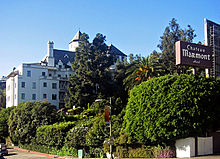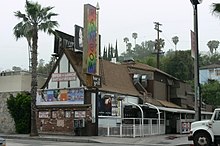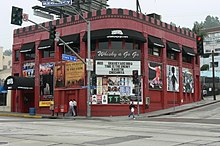Sunset Strip

The Sunset Strip is the 1.7-mile (2.7 km)[1] stretch of Sunset Boulevard that passes through the city of West Hollywood, California, United States. It extends from West Hollywood's eastern border with the city of Los Angeles near Marmont Lane to its western border with Beverly Hills at Phyllis Street. The Sunset Strip is known for its boutiques, restaurants, rock clubs, and nightclubs, as well as its array of huge, colorful billboards.
History
[edit]

Prior to the 1984 incorporation of the city of West Hollywood, the Sunset Strip lay in an unincorporated area of Los Angeles County. Because of this, the Sunset Strip and all of West Hollywood gained a reputation for being a loosely regulated area, in large part because it was not under the jurisdiction of the Los Angeles Police Department.
1920s
[edit]Gambling was illegal in the city of Los Angeles, but legal in unincorporated Los Angeles County, which fostered the development of rather wilder nightlife in West Hollywood than was found within the city limits. In the 1920s a number of nightclubs and casinos moved in along Sunset Strip, which attracted movie people; alcohol was served in back rooms during Prohibition.[1]
1930s and 1940s
[edit]In the 1930s and the 1940s, restaurants and nightclubs on Sunset Strip, like Sherry's, Ciro's, the Mocambo and the Trocadero, were patronized by people working in the movie industry. Some of its expensive nightclubs and restaurants were said to be[by whom?] owned by gangsters like Mickey Cohen and Bugsy Siegel, earning Sunset Strip a place in Raymond Chandler's 1949 Philip Marlowe novel, The Little Sister. Also on Sunset Strip are the Garden of Allah apartments—Hollywood quarters for transplanted writers like Robert Benchley, Dorothy Parker, and F. Scott Fitzgerald—and Schwab's Drug Store.
1960s
[edit]
By the early 1960s, Sunset Strip had lost favor with the majority of movie people, but its restaurants, bars and clubs continued to serve as an attraction for locals and tourists. In the mid-1960s it became a major gathering place for the counterculture and was the scene of the Sunset Strip curfew riots in November 1966, involving police and crowds of young club-goers. Those riots inspired the Buffalo Springfield song "For What It's Worth".
Sunset Strip became popular with rock musicians and their fans. Bands such as Led Zeppelin, the Doors,[2] the Byrds, Love, the Seeds, Frank Zappa, and others played at clubs like Gazzarri's, the Whisky a Go Go, the Roxy, Pandora's Box and the London Fog. In July 1965 Go-Go dancers also began performing. The Hyatt West Hollywood (now known as the Andaz West Hollywood) became a popular hotel.
1970s
[edit]
Rodney Bingenheimer's English Disco, influenced by Britain's glam rock movement, opened in 1972. It became a hangout for musicians, including the Stooges and the New York Dolls.[3] Clubs on the Sunset Strip at that time, Rodney Bingenheimer's in particular, were notorious for allowing teenage patrons. "Nobody carried or cared about ID's. Thirteen-year-old girls could walk in dressed like sexy 25-year-olds, and kids could sidle up to the bar and order a cocktail, so it wasn't a big stretch for us to get up and play there", recalled Quiet Riot founder Kelly Garni.[4] The 1979 Donna Summer song "Sunset People", from the album Bad Girls, was about the nightlife on Sunset Boulevard. Sunset Strip continued to be a major focus for punk rock and new wave music during the late 1970s.
1980s
[edit]
During the latter part of the 1970s and well into the 1980s, the Sunset Strip would become synonymous with the Los Angeles heavy metal movement, commonly referred to as the West Coast Metal Explosion.[5] The clubs on the Sunset Strip such as the Whisky a Go Go and The Roxy, became home to numerous LA-based heavy metal bands such as Van Halen, Quiet Riot, Mötley Crüe, Ratt and Guns N' Roses. The scene became synonymous with glam metal, with many fans mimicking the hair and clothing worn by the bands. The many heavy metal fans who would congregate outside the clubs along the strip became a defining feature.
The adoption of "pay to play" policies, in which bands were charged a fee to play at clubs, diminished its appeal to groups, other than as an industry showcase. As of the 2010s, the music industry establishment continues to dominate the clubs on Sunset Strip.[citation needed]
In November 1984, voters in West Hollywood passed a proposal on the ballot to incorporate, and the area became an independent city. Increasingly, the western end of Sunset Strip was occupied by office buildings, mostly catering to the entertainment industry, as well as hotels.[6]
1990s
[edit]During the 1990s, the center of the alternative music activity in Los Angeles shifted further east to areas like Echo Park, Silver Lake and Los Feliz.
Landmarks
[edit]| City of Los Angeles | ||
| Crescent Heights Boulevard | Crescent Heights Boulevard| | |
| Chateau Marmont | ||
| Marmont Lane | ||
| Pink Taco | City of West Hollywood | |
| Sweetzer Avenue | Sweetzer Avenue | |
| Carney's | ||
| Saddle Ranch | Sunset Tower | |
| Kings Road | ||
| Andaz West Hollywood | ||
| The Comedy Store | ||
| Piazza del Sol | Mondrian Hotel | |
| SkyBar | ||
| Pink Dot | ||
| Miller Drive | La Cienega Boulevard | |
| Fred Segal | ||
| Book Soup | ||
| The Viper Room | ||
| Clark Street | San Vicente Boulevard | |
| Whisky a Go Go | ||
| Roxy Theatre | ||
| Rainbow Bar and Grill | ||
| Doheny Drive | Doheny Drive | |
| 9200 Sunset | ||
| Soho House West Hollywood | ||
| Phyllis Street | ||
| City of Beverly Hills |
In popular culture
[edit]77 Sunset Strip, a 1958–1964 TV series, was set on Sunset Strip between La Cienega Boulevard and Alta Loma Road.
Studio 60 on the Sunset Strip was a behind-the-scenes television drama of a late-night comedy sketch show performed at a fictional theater on Sunset Strip.
Premiering on January 27, 2006, in Los Angeles at Vanguard Hollywood,[a] the Rock of Ages stage production inspired the 2012 film of the same name. Its story line is centered along Sunset Strip in 1987.[7][8][9][10][11][12][13][14]
The opening credits of the HBO TV series Entourage featured shots of Sunset Strip.[citation needed]
Los Angeles-based artist Edward Ruscha created the artist's book Every Building on the Sunset Strip in 1966,[15][16] later 12 Sunsets[17] website for the Getty Research Institute.[18]
Explanatory notes
[edit]- ^ Beginning on July 27, 2005, a 45 minute showcase of Rock Ages was first produced at the King King along Hollywood Boulevard in Los Angeles.[7][8][9]
References
[edit]Citations
[edit]- ^ a b Huffman, John Pearley (April 12, 2022). "The Sunset Strip Has Been a Moving Nightly Party for Nearly a Century". Road & Track. Retrieved October 5, 2022.
- ^ Dickey 2003, p. 389.
- ^ Chick 2009, p. 51.
- ^ "Quiet Riot original bassist and co-founder Kelly Garni talks Randy, Kevin and his new book with LRI". July 19, 2012. Retrieved January 1, 2022.
- ^ Ward, Steven. "Andy Secher, Hit Parader". Archived from the original on July 11, 2019. Retrieved January 1, 2022.
- ^ Mejía, Paula (December 30, 2024). "Once LA's vibrant nightlife epicenter, a storied street has a murky future". SFGATE. Retrieved December 31, 2024.
- ^ a b McDonnell, Evelyn (February 15, 2011). "'Rock of Ages' set for a victory dance at Hollywood's Pantages: The hair-metal musical left L.A. to strike it big on Broadway. Now it returns to Hollywood Boulevard a bona-fide hit and a Pantages headliner". Los Angeles Times. Retrieved October 25, 2016.
- ^ a b "'Rock of Ages' returns to the Pantages in Hollywood starring Dominique Scott in vintage 1980's redux". Los Angeles Life and Style. February 8, 2012. Retrieved October 25, 2016.
- ^ a b Lee, Ashley (November 18, 2014). "'Rock of Ages' to Take Final Broadway Bow: The musical will close on Jan. 18 after a six-year run". The Hollywood Reporter. Retrieved October 25, 2016.
- ^ "Laura Bell Bundy Stars in 'Rock of Ages' Tuner in LA Jan 26 – Feb 18". www.broadwayworld.com. November 30, 2005. Retrieved October 25, 2016.
- ^ "Rock of Ages Storms To Broadway 4/7, Previews Begin 3/20". www.broadwayworld.com. December 18, 2008. Retrieved October 25, 2016.
- ^ "Musical Chairs - ROCK OF AGES to Move to Helen Hayes; RAIN to Brooks Atkinson". www.broadwayworld.com. December 6, 2010. Retrieved October 25, 2016.
- ^ Weintraub, Steve "Frosty" (May 30, 2012). "Director Adam Shankman Talks Turning Tom Cruise into Stacee Jaxx, Choosing Songs, and Much More on the Set of ROCK OF AGES". Collider. TopLingo. Retrieved October 25, 2016.
- ^ Weintraub, Steve "Frosty" (May 30, 2012). "20 Things To Know About ROCK OF AGES From Our Set Visit; Plus Video Blog Recap and Pics from Set". Collider.com. TopLingo. Retrieved October 25, 2016.
- ^ Getty Research Institute
- ^ The Metropolitan Museum of Art
- ^ "12 Sunsets: Exploring Ed Ruscha's Archive". 12sunsets.getty.edu. Retrieved October 5, 2022.
- ^ Smee, Sebastian (January 9, 2021). "Ed Ruscha's stunning Sunset Strip art project lets you tour its full length, east to west — and back in time". The Washington Post. Retrieved October 5, 2022.
General bibliography
[edit]- Chick, Steve (2009). Spray Paint the Walls: The Story of Black Flag. Omnibus Press. p. 51. ISBN 978-0-857-12064-9.
- Dickey, Jeff (2003). Rough Guide to Los Angeles. Rough Guides. ISBN 978-1-843-53058-9.
External links
[edit]- The Sunset Strip – official site
